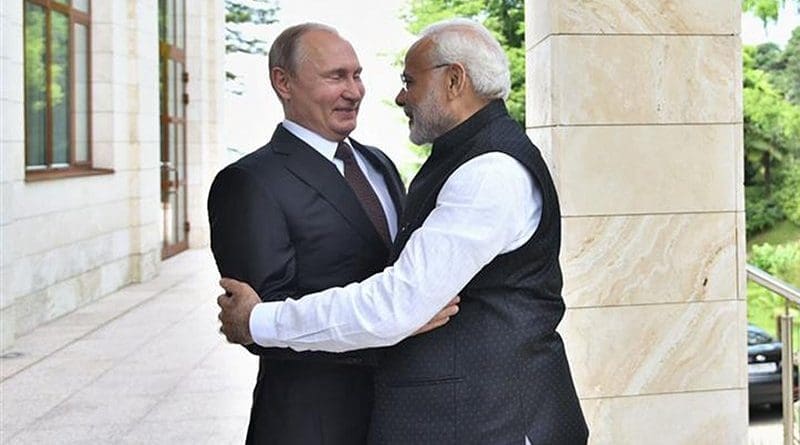Wuhan And Sochi Informal Summits – OpEd
By SAAG
By Dr Subhash Kapila
Evidence of PM Modi’s Successful Foreign Policy
Geopolitical imperatives centering on India’s increasing significance in 2018 arising from Indian PM Narendra Modi’s assertive foreign policy successes post-2014 have resulted in the invitations by the Chinese President and Russian President for the Informal Summits at Wuhan and Sochi within weeks in mid-2018
China and Russia as powerful global payers felt impelled in mid-2018 to invite Indian PM Modi for an ‘Informal Summit’ for free and unstructured discussions on a wide range of geopolitical issues which have cropped up by global uncertainties are a sure indicator that India has arrived and matters in global strategic calculus.
Analytically, however, both the Wuhan and Sochi Summits essentially differ in terms of contextual imperatives that spurred China and Russia. The common thread however being the geopolitical uncertainties generated in United States foreign policy thrusts by foreign policy directions of incumbent US President Trump.
Notably, the point that needs to be highlighted is that in terms of global geopolitical uncertainties generated by President Trump, it is China and Russia that are significantly impacted much more than India. Hence, the initiative coming much more from China and Russia in terms of holding ‘Informal Summits’ with Indian PM Modi.
China and Russia have been perturbed by the growing strategic proximity of United States and India on issues extending from Afghanistan on the Russian doorsteps to the South China Sea on China’s doorsteps. India under PM Modi holds the key in 2018 to the balance of power both in Asian security and global security.
In terms of contextual imperatives, China recognised that post-Dokalam 2017 India was not a military push-over to be trifled around by Chinese brinkmanship on the Himalayan Borders with China Occupied Tibet or in the Indian Ocean which China claims that the Ocean is no longer ‘Indian’.
Contextually, in 2018, China can be perceived as geopolitically isolated by the United States on its peripheries despite sporadic US aberrations.
With United States tightening screws in its ensuing ‘trade wars’ with China, the picture for China raises grave and uncertain prospects for China. China despite Chin’s asymmetrical military superiorities over India has begun to recognise that an India which spans the virtual entire length of China’s Southern underbelly cold complicate China’s strategic concerns for China. The latter becomes graver for China if the United Sates and India get more proximately intertwined in Asian security.
Moving to Russian imperatives to invite PM Modi for the Sochi Informal Summit while the ‘US Factor’ is definitely in play in terms of intentions for the invitation, there is an essential significant factor at play unlike China.
Russia and India have enjoyed half a century of a privileged Strategic Partnership until Russia’s peevish pivot to Pakistan under influence of Advisers like Zamir Kabulov. Russia seemingly seems to have recognised belatedly that such a peevish Russian response endangered not only Russian arms sale to India in a growing arms-sales market but also pushed India into a deeper strategic embrace of United States.
Russia may have belatedly realised that its pivot to Pakistan has not brought any dividends. It has resulted in India distancing itself from Russia lately.
India needed to be retrieved from moving deeper in a Strategic Partnership with the United States so as not to irretrievably endanger Asian and global security impacting Russian security interests. The historical background existed for this retrieval process. Unlike the Chinese President, the Russian President went out of the way to honour Indian PM at Sochi Summit including an unprecedented step of personally seeing him off at the airport.
Also, in terms of historical background, China carries a heavy burden of conflictual baggage in relation to India. China therefore has to walk many more additional miles than Russia to reach the level of mutual trust and confidence which prevailed between Russia and India for nearly half a century.
In the above context lies the crucial difference analytically between the Wuhan and Sochi Informal Summits with Indian PM Modi.
The next point to ponder is as to how much the Wuhan and Sochi Summits would lead to India getting more enmeshed in the strategic web of the Shanghai Cooperation Organisation, which is decidedly a counterweight to United States predominance. It is my belief that India in the overall analysis would synchronise most of its moves in the Shanghai Cooperation Organisation with Russia. India seemingly perceives that by staying within the Shanghai Cooperation Organisation as a Full Member would enable India to smooth some of the more jagged splinters of China endangering Indian security.
Also must be pondered upon is whether the Wuhan and Sochi Summits would pave the way for the resurrection of the Russia-China-India Strategic Triangle? On present indications, my assessment is that such is a distant possibility. Such an eventuality could possibly lead to a ‘bipolar division’ of global security architecture, which I think India does not certainly desire.
It is ironic and regrettable that India’s foreign policy successes under PM Modi should be devalued by India’s political Opposition parties for petty domestic political gains. Probably, the Wuhan and Sochi Informal Summits by China and Russia have possibly taken into account that PM Modi would continue to be the Prime Mistier of India in 2019 and beyond, and hence their foreign policy thrusts at Wuhan and Sochi. It is debatable whether China and Russia could have gone for such newsworthy Informal Summits at Wuhan and Sochi if they felt that there would be an uncertain Indian Prime Minister from the Indian Opposition. India’s political Opposition parties should note this reality.
Concluding, it needs to be stressed that India and Indian PM Narendra Modi stands tall in terms of foreign policy gains after the Wuhan and Sochi Summits. It is by no means aimed at the United States but aimed at India adhering to an assertive foreign policy consistent with India’s national security interests in a rapidly changing geopolitical environment.

